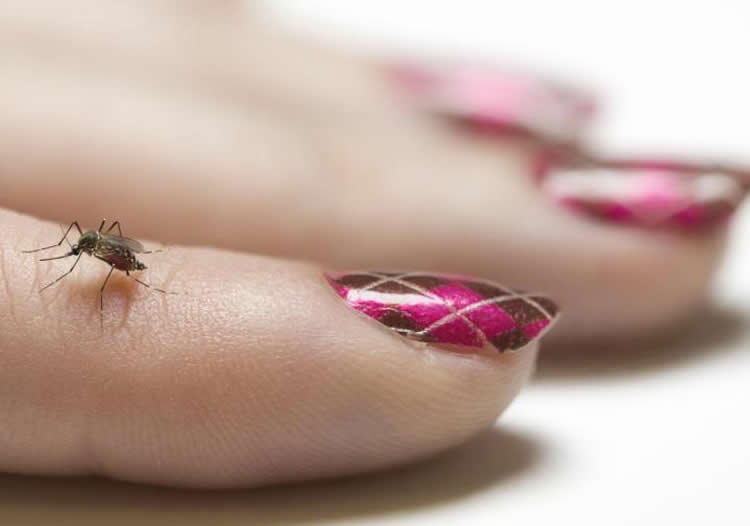Summary: A new study reveals mosquitoes can learn to associate a particular odor to an unpleasant shock, much like being swatted. Researchers report the insects tend to avoid the scent following the experience.
Source: Cell Press.
Most of us surely don’t think of mosquitoes as being especially adept at learning. But researchers reporting in Current Biology on January 25 now show that mosquitoes can in fact learn to associate a particular odor with an unpleasant mechanical shock akin to being swatted. As a result, they’ll avoid that scent the next time.
“Once mosquitoes learned odors in an aversive manner, those odors caused aversive responses on the same order as responses to DEET, which is one of the most effective mosquito repellents,” says Jeffrey Riffell (@RiffellLab) at the University of Washington, Seattle. “Moreover, mosquitoes remember the trained odors for days.”
It had been clear that mosquitoes don’t decide whom to bite at random. They show obvious preferences for some people over others. They are also known to alternate hosts seasonally, feeding on birds in the summer and mammals and birds during other parts of the year, for instance. Riffell and his colleagues wanted to find out more about how learning might influence mosquitoes’ biting preferences.
As a first step, they trained mosquitoes by pairing the odor of a particular person or animal species (a rat versus a chicken) with a mechanical shock. For the mechanical shock, they used a vortexer machine to simulate the vibrations and accelerations a mosquito might experience when a person tried to swat them. The insects quickly learned the association between the host odor and the mechanical shock and used that information in deciding which direction to fly. (Interestingly, they couldn’t learn to avoid the smell of a chicken.)

Learning in many animals, from honeybees to humans, depends on dopamine in the brain. Additional study showed that dopamine is also essential in mosquito learning. Genetically modified mosquitoes lacking dopamine receptors lost the ability to learn.
The researchers also glued mosquitoes to a custom 3D-printed holder that allowed the insects to still fly in place while the activity of neurons in the olfactory center of their brains was recorded. Those experiments showed that without dopamine, those neurons were less likely to fire. As a result, mosquitoes became less able to process and learn from odor information.
The findings may have important implications for mosquito control and the transmission of mosquito-borne diseases, according to the researchers.
“By understanding how mosquitoes are making decisions on whom to bite, and how learning influences those behaviors, we can better understand the genes and neuronal bases of the behaviors,” Riffell says. “This could lead to more effective tools for mosquito control.”
With this new understanding of how mosquitos learn to avoid certain hosts, the researchers say they are now exploring mosquitoes ability learn and remember favored hosts. “In both cases, we think dopamine is a critical component,” Riffell says.
Funding: We acknowledge the support of the Air Force Office of Sponsored Research, the National Institutes of Health, the National Science Foundation, UC Riverside, MaxMind, an Endowed Professorship for Excellence in Biology, the University of Washington Institute for Neuroengineering, and the Human Frontiers in Science Program.
Source: Joseph Caputo – Cell Press
Publisher: Organized by NeuroscienceNews.com.
Image Source: NeuroscienceNews.com image is credited to Kiley Riffell.
Original Research: Open access research in Current Biology.
doi:10.1016/j.cub.2017.12.015
[cbtabs][cbtab title=”MLA”]Cell Press “If You Swat Mosquitoes, They May Learn to Avoid Your Scent.” NeuroscienceNews. NeuroscienceNews, 26 January 2018.
<https://neurosciencenews.com/mosquitoes-scent-8381/>.[/cbtab][cbtab title=”APA”]Cell Press (2018, January 26). If You Swat Mosquitoes, They May Learn to Avoid Your Scent. NeuroscienceNews. Retrieved January 26, 2018 from https://neurosciencenews.com/mosquitoes-scent-8381/[/cbtab][cbtab title=”Chicago”]Cell Press “If You Swat Mosquitoes, They May Learn to Avoid Your Scent.” https://neurosciencenews.com/mosquitoes-scent-8381/ (accessed January 26, 2018).[/cbtab][/cbtabs]
Abstract
Modulation of Host Learning in Aedes aegypti Mosquitoes
Highlights
•Aversive learning by mosquitoes suppresses responses to human hosts
•Mosquitoes can learn the association between mechanical shock and certain odorants
•CRISPR/Cas9 modification of the dopamine-1 receptor prevents learning
•Dopamine causes heterogeneous modulation of antennal lobe neurons
Summary
How mosquitoes determine which individuals to bite has important epidemiological consequences. This choice is not random; most mosquitoes specialize in one or a few vertebrate host species, and some individuals in a host population are preferred over others. Mosquitoes will also blood feed from other hosts when their preferred is no longer abundant, but the mechanisms mediating these shifts between hosts, and preferences for certain individuals within a host species, remain unclear. Here, we show that olfactory learning may contribute to Aedes aegypti mosquito biting preferences and host shifts. Training and testing to scents of humans and other host species showed that mosquitoes can aversively learn the scent of specific humans and single odorants and learn to avoid the scent of rats (but not chickens). Using pharmacological interventions, RNAi, and CRISPR gene editing, we found that modification of the dopamine-1 receptor suppressed their learning abilities. We further show through combined electrophysiological and behavioral recordings from tethered flying mosquitoes that these odors evoke changes in both behavior and antennal lobe (AL) neuronal responses and that dopamine strongly modulates odor-evoked responses in AL neurons. Not only do these results provide direct experimental evidence that olfactory learning in mosquitoes can play an epidemiological role, but collectively, they also provide neuroanatomical and functional demonstration of the role of dopamine in mediating this learning-induced plasticity, for the first time in a disease vector insect.






